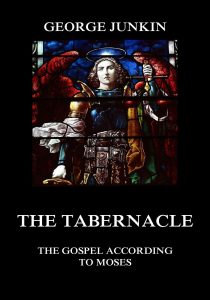The Tabernacle – The Gospel According to Moses – George Junkin
This volume exhibits in a clear light the well-known characteristics of its venerable author. It has his vivacity, his point, his fertility of imagination, his unwavering confidence in the truth of what he teaches, and the wonderful power which his imagination and feelings have over his convictions. “This tiny book,” he says, “is a compend of Christian theology. I say Christian theology; for I have, long ago, been forced into the conviction that without a diligent study of the tabernacle, no man ever acquires clear, transparent, and practical views of evangelical truth in systematic order.”

The Tabernacle – The Gospel According to Moses
Format: Paperback.
The Tabernacle – The Gospel According to Moses.
ISBN: 9783849677367.
Available at amazon.com and other venues.
Biography of George Junkin (from wikipedia.com)
He was the son of Joseph Junkin, and the sixth of fourteen children born in Cumberland County, Pennsylvania. His early years were spent on his father’s farm where he prepared for college. He graduated from Jefferson College now Washington and Jefferson College in 1813. After studying theology privately, he entered the Theological Seminary of the Associate Reformed Presbyterian Church, in New York City and was licensed to preach by the Presbytery of Monongahela in 1816. He was soon called to the charge of the United Congregations of Milton, Pennsylvania and McEwensville, Pennsylvania, where he remained for about eleven years. He left the reformed denomination to become a Presbyterian in 1822. In 1830 he became Principal of the Manual Labor Academy, at Germantown, Pennsylvania, one of the first institutions of the kind to go into operation in the United States. Two years later he became the first President of Lafayette College. In 1841 he accepted the Presidency of Miami University in Oxford, Ohio remaining three years, when he again returned to Easton. He was Moderator of the General Assembly in 1844.
In November 1848 he became the President of Washington College (now Washington and Lee University) in Lexington, Virginia; he followed Henry Ruffner as president. Junkin’s published speeches as president of Washington College include his inaugural address in February 1849 and one at Rutgers College in July 1856. Junkin remained at Washington College until May, 1861, when he resigned the presidency at the age of 71 and moved to Philadelphia amidst controversy regarding his pro-Union views and Virginia’s secession from the United States. Confederate General Stonewall Jackson had been Junkin’s friend and eventually son in law when Jackson was a teacher at the Virginia Military Institute, which also is located in Lexington. The movie Gods and Generals briefly portrays the poignant end to this friendship, at the start of the Civil War, when Jackson joined the Confederate army (taking one of Junkin’s sons with him) and Junkin departed for Pennsylvania. During the War, Junkin wrote a polemical attack on secession, which was also critical of abolitionists. He died in Philadelphia in 1868 and he was later reburied in Lexington, Virginia. His headstone incorrectly indicates that he was the founder of Miami University.
Among Junkin’s children were, Elinor, the first wife of Confederate General Stonewall Jackson, the poet Margaret Junkin Preston, and a son, George Junkin, Jr.
Publisher’s Note: This book is printed and distributed by Createspace a DBA of On-Demand Publishing LLC and is typically not available anywhere else than in stores owned and operated by Amazon or Createspace.
